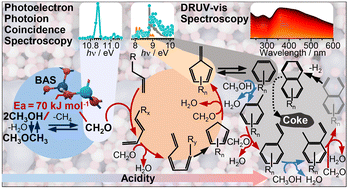The formation, reactivity and transformation pathways of formaldehyde in the methanol-to-hydrocarbon conversion†
Abstract
Coke-induced catalyst deactivation is one of the major challenges in commercial methanol-to-hydrocarbon (MTH) conversion processes. It is suspected to be critically dependent on formaldehyde-mediated reactions. Using photoelectron photoion coincidence and operando diffuse reflectance UV-vis spectroscopy techniques, we reveal details of formaldehyde formation and reactivity over industrially relevant ZSM-5 catalysts, and its role in the coke formation. We show that in the early stage of the MTH reaction, formaldehyde is mainly obtained via methanol disproportionation, with a moderate apparent activation energy of 70 kJ mol−1. In the fully developed reaction phase, it readily converts alkenes into dienes and aliphatic polyenes, which are then promptly converted to methylbenzenes, naphthalenes, and polycyclic arenes that compose coke. We evidence increased reactivity of formaldehyde and dienes over catalysts exhibiting higher productivity of arenes and high propensity to coking. The results suggest that the consumption of this intermediate is not only dependent on the concentration of Brønsted acid sites, but also on their nature, the presence of Lewis acid sites, and framework defects. A high reactivity of cyclopentadienes towards formaldehyde and detection of fulvenes indicate their involvement as key intermediates in the transformation of alkenes to akylbenzenes. The identification of styrene and indene derivatives suggests a pathway to polycyclic arenes by condensation of formaldehyde with aliphatic substituents on arene rings, followed by cyclization. The results demonstrate the pivotal role of formaldehyde in the MTH reaction.



 Please wait while we load your content...
Please wait while we load your content...